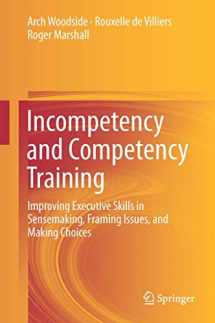
Incompetency and Competency Training: Improving Executive Skills in Sensemaking, Framing Issues, and Making Choices
ISBN-13:
9783319391069
ISBN-10:
3319391062
Edition:
1st ed. 2016
Author:
Arch Woodside, Roger Marshall, Rouxelle de Villiers
Publication date:
2016
Publisher:
Springer
Format:
Hardcover
295 pages
FREE US shipping
Book details
ISBN-13:
9783319391069
ISBN-10:
3319391062
Edition:
1st ed. 2016
Author:
Arch Woodside, Roger Marshall, Rouxelle de Villiers
Publication date:
2016
Publisher:
Springer
Format:
Hardcover
295 pages
Summary
Incompetency and Competency Training: Improving Executive Skills in Sensemaking, Framing Issues, and Making Choices (ISBN-13: 9783319391069 and ISBN-10: 3319391062), written by authors
Arch Woodside, Roger Marshall, Rouxelle de Villiers, was published by Springer in 2016.
With an overall rating of 4.0 stars, it's a notable title among other
books. You can easily purchase or rent Incompetency and Competency Training: Improving Executive Skills in Sensemaking, Framing Issues, and Making Choices (Hardcover) from BooksRun,
along with many other new and used
books
and textbooks.
And, if you're looking to sell your copy, our current buyback offer is $0.3.
Description
This book covers theory and practice of competency and incompetency training. ‘Incompetency training’ includes formal and informal instruction that consciously (purposively) or unconsciously imparts knowledge, attitudes, beliefs, and behavior (including procedures) that are useless, inaccurate, misleading, and/or will lower performance outcomes of the trainee versus no training or training using alternative training methods. This book offers an early workbench model of incompetency training theory which proposes that executives and associates in firms, academia, and government organizations consciously as well as unknowingly offer incompetency training in many contexts. The evidence so far has shown that increasing trainees' vigilance and ability to recognize exposure to incompetency-training may help trainees to decrease the effectiveness (impact) of exposures to incompetency training―advancing incompetency training theory and knowledge of incompetency training practice may be necessary conditions for remedying negative outcomes that follow from trainees receiving such training. The book uses a series of laboratory experiments to elicit on tools advocated in the literature as aids in increasing incompetency and/or competency, and provides a comprehensive review of the literature on (in)competency training.


We would LOVE it if you could help us and other readers by reviewing the book
Book review

Congratulations! We have received your book review.
{user}
{createdAt}
by {truncated_author}


